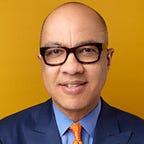A Bright New Generation Battles Inequality
“This is a tremendous opportunity to get in front of questions about how philanthropy and our economic system intertwine.”
When I first shared the foundation’s statement “Toward a New Gospel of Wealth” in October 2015, I had hoped we might kindle a larger conversation (like this one) about the complex relationship between philanthropy and inequality. What I didn’t entirely anticipate — and have been deeply gratified to see — are the numerous ways that our colleagues across philanthropy are not just preaching but practicing this new gospel of giving.
We see it in the work of new philanthropists like Cari Tuna and Dustin Moskovitz. We see it in Leonardo DiCaprio’s bold commitment to those most vulnerable in the face of climate change. We see it in the inspiring commitments of Priscilla Chan and Mark Zuckerberg. Indeed, we see it in an entire generation of philanthropists — visionaries committed to driving social justice by putting grantees and beneficiaries behind the wheel.
This is an exciting moment for philanthropy. The injection of new ideas, new institutions, new money, and new technology all contribute to my own optimism that our sector will continue to build on the progress of the last several decades.
Moreover, this is a pivotal time in our national (and global) conversation about, and our evolving consciousness of, inequality. During this presidential season alone, we’ve seen the rise of populism on both the left and the right — a clear reaction to the unprecedented levels of inequality afflicting both our country and the world. We’ve also seen polls showing that dissatisfaction with the capitalist system is on the rise, particularly among young people — a reminder that these frustrations will only continue, if not increase, in the coming years. This discontent will inevitably (and necessarily) raise hard questions that all of us must be prepared to answer.
At the same time, as more people — particularly those in positions of power — become more comfortable addressing this crisis of inequality in all its forms, our chances of disrupting this pervasive imbalance improve.
For institutions like the Ford Foundation, which have accumulated large amounts of capital since their founding, we must find new ways to leverage that capital for positive social and financial outcomes. Right now, the foundation is investigating how we might make our endowment strategy align with our program strategy.
For the new generation of donors, this is a tremendous opportunity to get in front of questions about how philanthropy and our economic system intertwine, and to find new ways forward.
Ultimately, the “New Gospel of Wealth” calls on all of us to think differently about how philanthropy operates in the 21st century. New and established institutional donors alike must take this opportunity to evolve our philanthropic enterprise to grapple with the many challenges that we see in our sector, and our world. I could not be more thrilled by — or more hopeful for — the work we’ll do together in the years ahead, or to see this “New Gospel” increasingly preached and practiced across philanthropy.
This forum first appeared at the Nation magazine. // The Development Set is made possible by funding from the Bill & Melinda Gates Foundation. We retain editorial independence
